INTRODUCTION
Menstruation, also described by many as the period is the monthly/regular of blood and mucus from the womb[uterus]. This usually lasts for 2 – 7 days and occurs in a 21 – 35 day cycle interval. In younger ladies, the cycle interval could last up to 45 days or more because of the immaturity of the higher centre [hypothalamus and pituitary glands].
The first menses is known as menarche and occurs earlier in developed countries possibly due to faster development and heavier weights of the girls. The average age for commencement of menstrual flow is 12 years but has been known to commence as early as 9 years in some and as late as 15 years. If a girl has not commenced menstruation at age 16 years, she Is said to have primary amenorrhoea.
Regular menstrual flow is usually a sign that a lady is fertile and can get pregnant, while lack of regular menses or absent menses could be a sign of fertility challenges.
Terminologies
Last menstrual period [LMP]: This is the first day of the last menses. For example, if a woman’s last menses commenced on the 15th of February, her LMP is that day [and not the day it ended].
Menarche: This is the very first menses and represents the day the lady initiated her menses.
Menstrual cycle interval [length]: This is the difference between the first day of one cycle [period] and the first day of the next cycle [period]. Hence, if a lady’s previous cycle commenced on the 1st of February and the next cycle commenced on the 26th of February, her cycle interval is 25 days.
Menopause: This is the final cessation of menses. It is said to occur when a lady has not seen her menses consecutively for 12 months. It occurs from age 47 – 51 years.
SYMPTOMS
While menstruation is a normal occurrence in women, it could cause some discomfort in women. These include:
- Menstrual pains/cramps.
Also called dysmenorrhea, many women experience various degree of cramping during menses. It is due to the release of a substance called prostaglandin and can be relieved by taking Non-Steroidal Anti-Inflammatory Drugs [NSAIDs] such as Cataflam, or ibuprofen.
Dysmenorrhea may be accompanied by nausea, vomiting and headache.
- Increased menstrual bleeding
Most women menstruate for 2 – 7 days in a normal cycle; in a few cases, the duration of flow could exceed 7 days and become associated with the passage of dark blood clots and usage of more sanitary pads than previously. If this occurs regularly, the woman’s haemoglobin concentration or packed cell volume drops leading to anaemia. In a few cases, she may require a blood transfusion.
- Irregular menses
Menses could become irregular in terms of the number of days of flow, cycle length, amount of flow and how regular the cycle comes up.
The majority of women menstruate for 2 – 7 days, in a cycle interval of 21 – 35 days. Values outside these ranges may be abnormal requiring consultation.
- Mood swings
A good number of women suffer mood swings of variable severity. This is usually described as feeling anxious by many. It is usually self-limiting.
MECHANISM OF MENSTRUATION
Every month, after a lady’s menses several follicles in the ovaries begin to grow [under the influence of FSH from the pituitary gland and hypothalamus] and produce estrogen. The estrogen produced by the follicles acts on the lining of the uterus to make it proliferate and grow. About 14 days from the onset of menses, there is a surge of hormones leading to ovulation [release of the eggs]. Following ovulation, the follicle gets converted to the corpus luteum and starts secreting progesterone which converts the proliferative endometrium to secretory. The secretory endometrium is conducive for implantation in the event of pregnancy occuring. If no pregnancy occurs, this secretory endometrium sloughs off as menstrual blood in a predictable pattern.
MANAGEMENT OF MENSTRUATION
Females are counselled to use sanitary pads to absorb menstrual blood. These are disposable materials that could be burnt or wrapped in a disposable container and thrashed.
It is not advisable to dispose of the used pad into the toilet because it could block the flow.
During the menstrual period, ladies are advised to maintain a high level of hygiene and possibly bathe twice a day. It is advisable to wash the hands with soap and water after changing the pad.
COMPLICATIONS
Menstruation could be complicated by:
Menorrhagia
Heavy menstrual flow.
Dysmenorrhea
Painful menses
Irregular menses
Menses coming up at irregular intervals or prolonged flow.
WHEN TO SEE A DOCTOR
You are advised to see your doctor if you experience the following.
- If you are 16 years and not started menstruating
- If you have missed your menses for 3 – 6 months and you’re pregnant or past the age of menopause
- If you have heavy or painful menses

